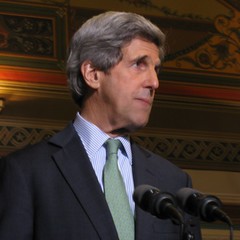Tuesday
May052009
DOD Official: Sailors Should Fight Somali Pirates Themselves
By Michael Ruhl, University of New Mexico - Talk Radio News Service
The most effective way to deal with piracy off of the Somali coast is for the sailors to defend themselves, according to a Defense Department representative testifying to the Senate Armed Services Committee today.
Michele Flournoy, Under Secretary of Defense for Policy, said that of the recent pirate attacks in Somalia the most effective means of fending off the pirates came from actions taken by the crews themselves.
“The single most effective short-term response to piracy will be working with merchant shipping lines to ensure that vessels in the region take appropriate security measures themselves,” Flournoy said. She continued that it is not possible for the U.S. military to prevent or intervene in every pirate attack, but if crews take appropriate measures, “the vast majority of pirate attacks can be thwarted without any need for military intervention.”
There were 122 attempted pirate attacks in 2008, of which only 42 resulted in crewmembers becoming captured. Of the unsuccessful attacks, 78 percent of them were stopped by the crews actions, with the others being stopped by military intervention, according to Flournoy.
Flournoy divided crew countermeasures into two categories: passive and active defense measures. Passive measures are those which don’t necessarily require direct confrontation with the pirates, and can include physical obstructions to boarding points, avoiding high-risk waters, creating fortified “safe rooms” in the ship, posting lookouts at all times, and maintaining contact with maritime security forces. Active defense measures can include using fire hoses and small arms to repel pirates and a military presence on the boat. Both of these defensive measures are important for crews to talk to defend themselves, Flournoy said.
She believes that the complexity of this situation necessitates a multifaceted approach, which is why the aforementioned measures should be combined with greater military patrols and economic development. Additionally, the Defense Department would like to see more states willing to prosecute the pirates. Presently, Kenya is one of the only nations to actually place Somali pirates on trial.
According to Flournoy, since August 2008 36 pirate vessels have been destroyed or confiscated, small arms have been seized, and 146 pirates have been turned over to law enforcement officers.
The most effective way to deal with piracy off of the Somali coast is for the sailors to defend themselves, according to a Defense Department representative testifying to the Senate Armed Services Committee today.
Michele Flournoy, Under Secretary of Defense for Policy, said that of the recent pirate attacks in Somalia the most effective means of fending off the pirates came from actions taken by the crews themselves.
“The single most effective short-term response to piracy will be working with merchant shipping lines to ensure that vessels in the region take appropriate security measures themselves,” Flournoy said. She continued that it is not possible for the U.S. military to prevent or intervene in every pirate attack, but if crews take appropriate measures, “the vast majority of pirate attacks can be thwarted without any need for military intervention.”
There were 122 attempted pirate attacks in 2008, of which only 42 resulted in crewmembers becoming captured. Of the unsuccessful attacks, 78 percent of them were stopped by the crews actions, with the others being stopped by military intervention, according to Flournoy.
Flournoy divided crew countermeasures into two categories: passive and active defense measures. Passive measures are those which don’t necessarily require direct confrontation with the pirates, and can include physical obstructions to boarding points, avoiding high-risk waters, creating fortified “safe rooms” in the ship, posting lookouts at all times, and maintaining contact with maritime security forces. Active defense measures can include using fire hoses and small arms to repel pirates and a military presence on the boat. Both of these defensive measures are important for crews to talk to defend themselves, Flournoy said.
She believes that the complexity of this situation necessitates a multifaceted approach, which is why the aforementioned measures should be combined with greater military patrols and economic development. Additionally, the Defense Department would like to see more states willing to prosecute the pirates. Presently, Kenya is one of the only nations to actually place Somali pirates on trial.
According to Flournoy, since August 2008 36 pirate vessels have been destroyed or confiscated, small arms have been seized, and 146 pirates have been turned over to law enforcement officers.
tagged  2008,
2008,  2009,
2009,  Defense department,
Defense department,  Kenya,
Kenya,  Michael Ruhl,
Michael Ruhl,  Michele Flournoy,
Michele Flournoy,  Piracy,
Piracy,  Ruhl,
Ruhl,  Senate Armed Services,
Senate Armed Services,  Somalia,
Somalia,  department of defense,
department of defense,  economic development,
economic development,  economy,
economy,  law,
law,  legal,
legal,  michael,
michael,  michael t ruhl,
michael t ruhl,  michaeltruhl,
michaeltruhl,  military,
military,  pirate,
pirate,  pirates,
pirates,  senate,
senate,  senate armed services committee in
senate armed services committee in  Congress,
Congress,  Frontpage 1,
Frontpage 1,  News/Commentary
News/Commentary
 2008,
2008,  2009,
2009,  Defense department,
Defense department,  Kenya,
Kenya,  Michael Ruhl,
Michael Ruhl,  Michele Flournoy,
Michele Flournoy,  Piracy,
Piracy,  Ruhl,
Ruhl,  Senate Armed Services,
Senate Armed Services,  Somalia,
Somalia,  department of defense,
department of defense,  economic development,
economic development,  economy,
economy,  law,
law,  legal,
legal,  michael,
michael,  michael t ruhl,
michael t ruhl,  michaeltruhl,
michaeltruhl,  military,
military,  pirate,
pirate,  pirates,
pirates,  senate,
senate,  senate armed services committee in
senate armed services committee in  Congress,
Congress,  Frontpage 1,
Frontpage 1,  News/Commentary
News/Commentary 







Obama Wants You to Go Back to School
President Barack Obama
Photo by Michael Ruhl
Obama’s plan, detailed at opportunity.gov, would help the unemployed go back to school to build new skill sets, with the goal of helping them gain future employment through specialized technical training.
“The idea here is to fundamentally change our approach to unemployment in this country, so that it’s no longer just a time to look for a new job, but is also a time to prepare yourself for a better job,” Obama said. “Our unemployment system should be not just a safety net, but a stepping stone to a new future.”
Among the barriers to success that the President wants to break down are state programs in which a worker might lose temporary financial support if they were to enroll in an education program. Obama said that in some places a worker may be unemployed, but may not qualify for federal assistance to get an education because of the salary they had a year ago but no longer make. The President said that he is committed to working with states to change these laws.
The President said that knowledge is the most valuable skill that one can sell. He encouraged all Americans to aim for getting at least 1 year of higher education, whether it is a community college, a four year school, vocational training or an apprenticeship.
“By 2020, America will once again have the highest proportion of college graduates in the world,” Obama said optimistically.
This announcement came on the same day as the release of April’s unemployment statistics, which saw the loss of more than half a million jobs. The unemployment rate for April was 8.9 percent, up from 8.5 percent in March and 8.1 percent in February. April's numbers have already surpassed both the White House's and the Federal Reserve's projections for all of 2009, which were 8.1 percent and 8.8 percent, respectively.
Acknowledging that unemployment is as its highest rate in 25 years, the President urged patience, reminding us that the economic problems didn’t happen overnight, and couldn’t be fixed immediately.
“We’re still in the midst of a recession that was years in the making and will be months or even years in the unmaking,” Obama said. He continued, “We should expect further job losses in the months to come.”
Obama said that the Economic Stimulus Package is yielding real results, manifest in higher consumer spending and home sales, and an increase in construction spending. He praised the Recovery Act, and said, “Because of this plan, cops are still on the beat and teachers are still in the classroom; shovels are breaking ground and cranes dot the sky; and new life has been breathed into private companies.”
Fixing the economy and reforming education are two goals Obama has set for his administration. He said that in the weeks to come he would start working towards more education initiatives.